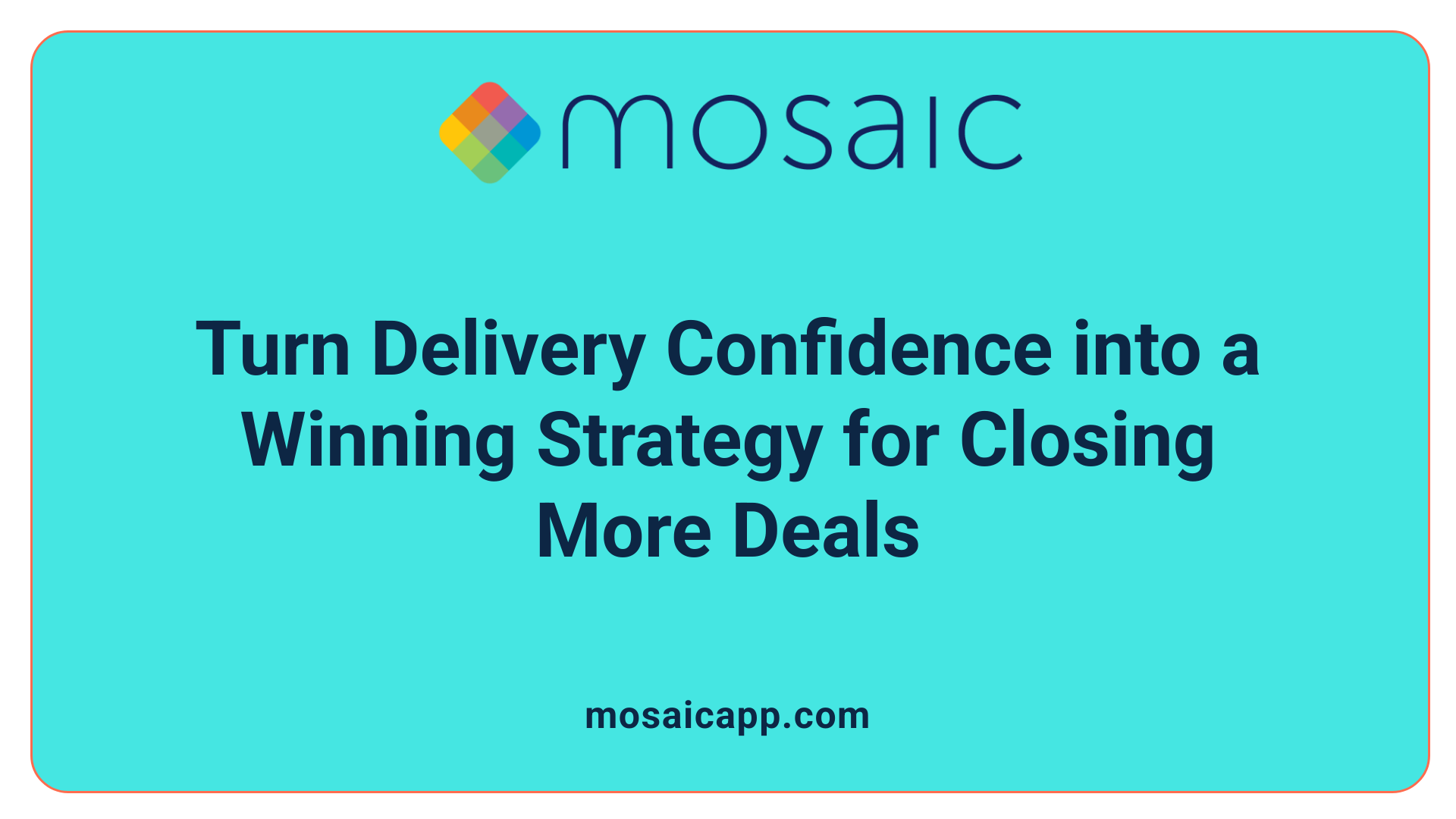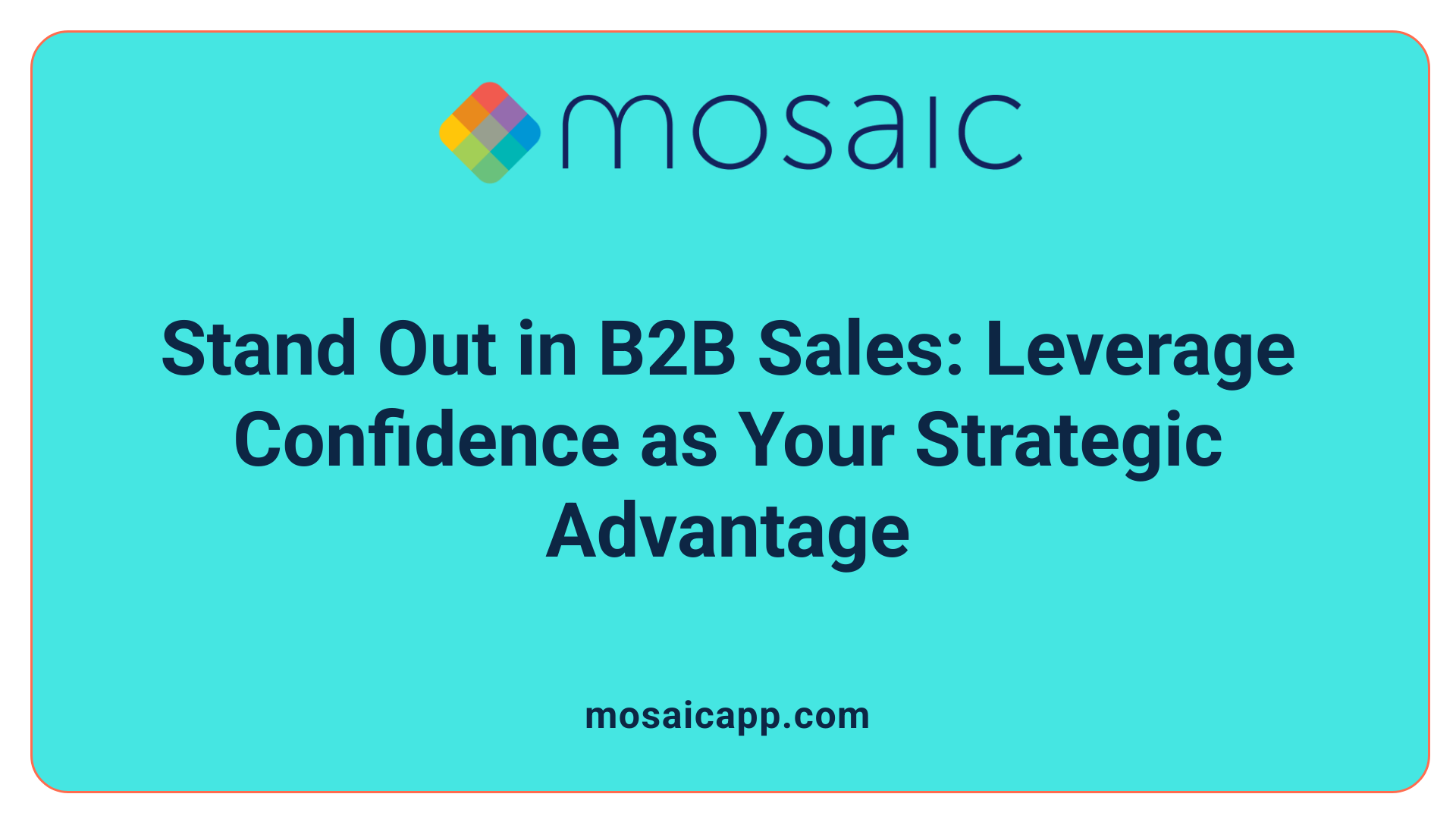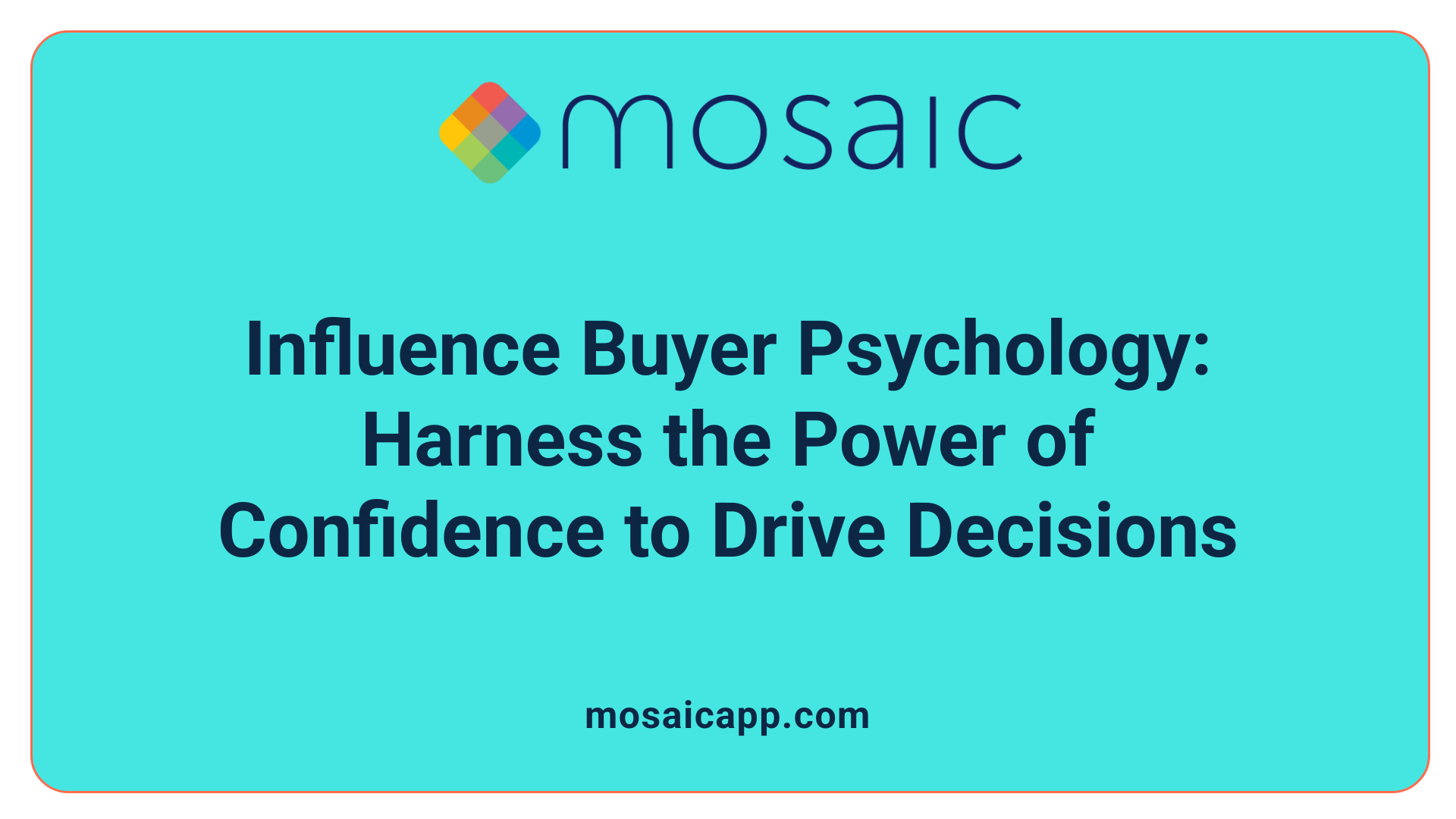Harnessing Confidence and Capacity Truth in B2B Sales
In the competitive landscape of B2B sales, delivery confidence emerges as a crucial strategic asset. It serves not only to win deals but also to establish long-term trust and differentiation. This article explores how sales teams can build, sustain, and leverage confidence rooted in capacity truth to navigate complex buying journeys, especially when engaging skeptical or senior buyers.
The Foundations of Sales Confidence
What are some effective strategies for building and maintaining sales confidence to enhance sales effectiveness?
Building and maintaining confidence in sales roles is fundamental for success, especially in the complex realm of B2B transactions. A comprehensive approach involves continuous learning, practice, and leveraging technology.
One primary strategy is providing regular, targeted sales training that deepens product and industry knowledge. When salespeople understand their offerings thoroughly and grasp the broader industry landscape, they feel more competent and ready to address client concerns.
Role-playing, simulations, and objection handling are practical techniques that help sales teams develop natural confidence in their communication skills. These exercises mimic real situations, allowing reps to refine their approach and reduce uncertainty.
Coaching and mentoring also play critical roles. Supportive feedback, celebrating small wins, and fostering a growth-oriented environment build resilience and a positive outlook, which sustains confidence even during challenging moments.
Technology is increasingly vital in this process. Utilizing AI tools like discovery call prep agents or financial report analyzers can improve preparation, making engagements more professional and tailored. These tools help reduce uncertainties and streamline the sales process.
Setting clear, achievable goals using SMART criteria, alongside monitoring performance through relevant sales metrics, helps maintain a focused and confident attitude. When salespeople track their progress and see tangible results, their confidence naturally grows.
Ultimately, confidence stems from a blend of knowledge, practice, technology, and a supportive culture. When these elements are combined, sales teams are better positioned to engage effectively, handle tough conversations, and close deals with assurance.
Leveraging AI and Technology for Confidence Enhancement

How can AI tools improve sales confidence?
AI technologies are transforming how salespeople prepare and succeed in their interactions. Discovery call preparation agents use AI to analyze customer data, previous interactions, and industry specifics, enabling sales reps to approach calls with a well-rounded understanding. This preparation boosts confidence as reps enter conversations knowing they are armed with relevant insights.
Financial report analyzers are another valuable AI-driven resource. These tools quickly interpret complex financial data, helping salespeople understand a client’s financial health and needs. Armed with this knowledge, sales reps can tailor solutions more accurately, presenting themselves as credible experts, thus building trust.
What impact does technology have on sales confidence?
Incorporating AI into sales processes enhances confidence by providing consistent, data-driven support. Technology reduces uncertainty by clarifying complex topics, offering real-time insights, and automating routine tasks. This allows sales teams to focus on high-value activities like engaging with customers authentically.
Furthermore, AI-powered tools enable sellers to deliver more personalized and relevant pitches, increasing the likelihood of success. When salespeople feel well-prepared and informed, their conviction in what they are offering grows, making their interactions more persuasive and credible.
How does blending knowledge, empathy, and technological innovation benefit the buyer experience?
Combining deep product knowledge with emotional intelligence and advanced AI tools creates a comprehensive sales approach. This blend helps salespeople build genuine connections and demonstrate a sincere understanding of the buyer’s challenges.
As a result, buyers are more confident in the solutions presented, reducing hesitation and boosting their willingness to commit. Integrating these elements supports long-term trust, reinforcing the salesperson as a reliable partner rather than just a transactional figure.
| Technique/Tool | Purpose | Benefit |
|---|---|---|
| Discovery Call AI Agents | Prepare for calls | Increased confidence and relevance |
| Financial Report Analyzers | Interpret financial data | Better client understanding |
| Sales Training & Role-Playing | Improve skills | Reduced uncertainty |
| Personalized Collateral | Tailor messaging | Enhanced credibility |
By leveraging these technologies along with continuous learning and emotional intelligence, sales teams can project greater confidence, build stronger relationships, and ultimately close more high-quality deals.
Transforming Delivery Confidence into a Strategic Advantage

How can delivery confidence be used as a strategic asset to win deals, especially by focusing on capacity truth?
Delivery confidence plays a vital role in securing high-stakes deals by showcasing a company's true capabilities and reliability. When sales teams openly communicate their capacity—highlighting past successes, team expertise, and resource availability—they build trust with prospective clients. This transparency reduces buyer hesitations and perceived risks, encouraging decision-makers to move forward.
Managing client expectations through honest discussions about timelines, resources, and deliverables fosters a sense of certainty. When clients trust that a vendor can deliver as promised, it increases their confidence in the partnership, leading to a higher likelihood of closing.
Building this confidence involves consistent training for sales teams to use definitive language, demonstrate preparedness, and handle objections assertively. This approach creates emotional contagion, where buyers pick up on the seller's confidence, which further persuades them and strengthens their commitment.
Statistics reveal that sales professionals who project confidence are more successful in closing deals—confident sellers tend to outperform less assured counterparts.
By embedding delivery confidence into strategic client conversations and internal culture, organizations can differentiate themselves. This, in turn, helps close more deals, nurture long-term relationships, and maintain a competitive advantage in the marketplace.
| Aspect | Focus Area | Impact |
|---|---|---|
| Demonstrating Capacity | Team skills, resources, past delivery | Builds trust, reduces perceived risk |
| Managing Expectations | Transparency about timelines and limits | Fosters certainty, reduces buyer doubt |
| Emotional Influence | Confidence in communication | Enhances persuasion, mirrors buyer confidence |
Leveraging delivery confidence strategically turns an operational strength into a key sales advantage, supporting better outcomes and stronger client relationships.
Engaging Senior and Skeptical Buyers with Confidence

What role does confidence play in engaging senior or skeptical buyers in complex B2B sales?
Confidence is a crucial element when it comes to connecting with senior or highly skeptical buyers, especially within complex B2B sales scenarios. These buyers often face overwhelming information and high stakes, making trust and credibility vital to move the sales process forward.
A confident salesperson clearly demonstrates expertise and transparency, reassuring buyers that they are dealing with a genuine authority. This builds trust, which is essential for senior clients or skeptics who tend to scrutinize every detail before making decisions.
To foster confidence, sales professionals must deeply understand the buyer’s pain points and business challenges. Sharing verified success stories and providing concrete evidence of return on investment (ROI) help solidify credibility. These tactics not only validate the sales pitch but also show that the salesperson is genuinely invested in helping solve real problems.
Confidence also empowers sales reps to act as trusted advisors rather than mere sellers. This shift is particularly important since over 84% of buyers want guidance from knowledgeable partners. During conversations, effective active listening and emotional intelligence—such as reading non-verbal cues—support a more personalized and reassuring interaction.
Furthermore, confidence enables salespeople to handle tough questions and objections skillfully, which bolsters the buyer’s trust in their expertise. Overall, a confident approach facilitates a sense of security for skeptical or senior buyers, making them more comfortable in committing to complex purchase decisions.
In sum, a sales team that projects genuine confidence—through mastery of their product, understanding of the customer’s needs, and transparent communication—is more likely to engage skeptics successfully, ultimately closing larger, high-value deals with greater assurance.
Positioning Confidence as a Competitive Edge
 In the competitive landscape of B2B sales, confidence serves as a powerful differentiator that can set a salesperson apart from the competition. When sales professionals project certainty and expertise, they foster a perception of credibility and trustworthiness. Buyers are more inclined to engage with confident sellers because confidence signals that the seller thoroughly understands the product, the industry, and the customer’s needs.
In the competitive landscape of B2B sales, confidence serves as a powerful differentiator that can set a salesperson apart from the competition. When sales professionals project certainty and expertise, they foster a perception of credibility and trustworthiness. Buyers are more inclined to engage with confident sellers because confidence signals that the seller thoroughly understands the product, the industry, and the customer’s needs.
This perception of credibility significantly influences buyer engagement. Confident salespeople tend to build stronger relationships as their poise and assurance create a sense of reliability. Buyers feel reassured and more comfortable making decisions because they sense the seller’s competence and honesty. Transparency about product capabilities, realistic timelines, and possible limitations further reinforces this trust. When a seller demonstrates genuine conviction combined with honesty, it accelerates the trust-building process.
Positioning sales confidence as a core competency also impacts how buyers perceive the seller’s role as an advisor rather than just a product pusher. Confident sellers are better at guiding prospects through complex decision-making, helping them understand not just the features but also the real-world outcomes of a solution.
Using confidence strategically can lead to a smoother sales process and higher close rates. When paired with deep industry insights and continuous learning, confidence becomes an even more compelling competitive edge. This approach positions the salesperson as a reliable partner, ultimately driving increased customer loyalty and long-term success.
| Aspect | Effect | How It Enhances Sales |
|---|---|---|
| Perception of Credibility | Builds trust quickly | Buyers are more receptive to recommendations |
| Buyer Engagement | Fosters stronger connections | Enables deeper relationship development |
| Relationship Building | Creates long-term loyalty | Encourages repeat business and referrals |
Confidence isn't just about feeling self-assured—it's about convincingly conveying expertise, which turns prospects into loyal clients. Cultivating this confidence through ongoing education, transparent communication, and leveraging tools like AI-enhanced preparation can help sales teams stand out and succeed consistently.
The Psychological Impact of Confidence on Buyer Decisions

How does sales confidence influence customer decision-making and buyer psychology?
Sales confidence plays a crucial role in shaping how buyers perceive and decide on a purchase. When salespeople demonstrate genuine confidence, it helps establish trust and credibility with potential clients. This trust reduces buyers’ anxiety and perceived risks associated with complex B2B transactions, making them more comfortable and open to engagement.
Confident salespeople also skillfully utilize psychological principles like social proof, reciprocity, and scarcity. For example, sharing testimonials, case studies, or endorsements offers social proof that others have benefited from the product or service, reinforcing the buyer’s confidence. Offering personalized solutions or incentives can trigger reciprocity, making buyers more inclined to reciprocate with a positive decision. Creating a sense of scarcity or urgency motivates buyers to act promptly, fearing they might miss out.
Furthermore, strong confidence in the salesperson’s communication activates mirror neurons in buyers' brains. This neural response fosters rapport and emotional connection, allowing buyers to mirror positive feelings conveyed through the salesperson’s tone and body language. As a result, the buyer feels understood and connected, which enhances persuasion.
Sales confidence also signals expertise and authority. Buyers tend to be more receptive when they perceive their salesperson as knowledgeable and capable. This perception increases the likelihood of commitments and long-term relationships.
In essence, confident selling influences not just conscious rational evaluations but also subconscious emotional triggers. It guides buyers toward favorable decisions by creating a positive emotional environment and reducing perceived risks, ultimately leading to higher close rates and more substantial commitments.
Harnessing Confidence and Capacity Truth for Long-term Success
Building and leveraging delivery confidence rooted in capacity truth is not merely a tactical advantage but a strategic necessity in modern B2B sales. It enables sales teams to foster trust, differentiate themselves, and effectively guide buyers through complex decision journeys. By integrating continuous learning, technological tools, and transparent communication, sales organizations can project authentic confidence that resonates with buyers’ psychological needs, reduces skepticism, and accelerates deal closure. Ultimately, sales confidence rooted in capacity and transparency transforms from a soft skill into a powerful sales asset that secures high-value deals, enhances reputation, and sustains long-term success.
References
- Sell With Confidence: How to Win Over Skeptical Buyers
- Yes, confidence matters when selling - but not where you ...
- Sales Confidence: 6 Strategies To Harness Assertiveness
- Gartner Keynote Key B2B Sales Customer Self Confidence
- 7 Tips for Building Confidence in Sales
- Sell With Confidence: How to Win Over Skeptical Buyers
- Confidence: The Sales Superpower No One Talks About -
- Why Building Confidence in Sales is the Key to Sales ...
